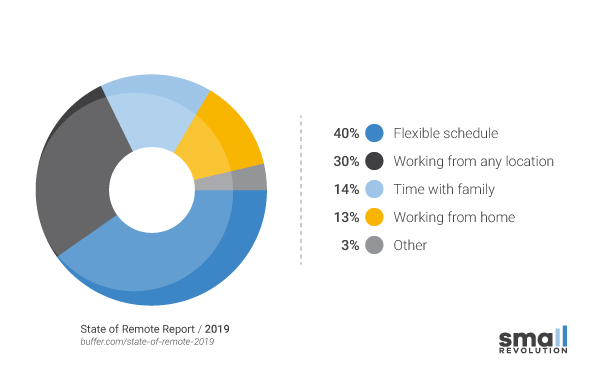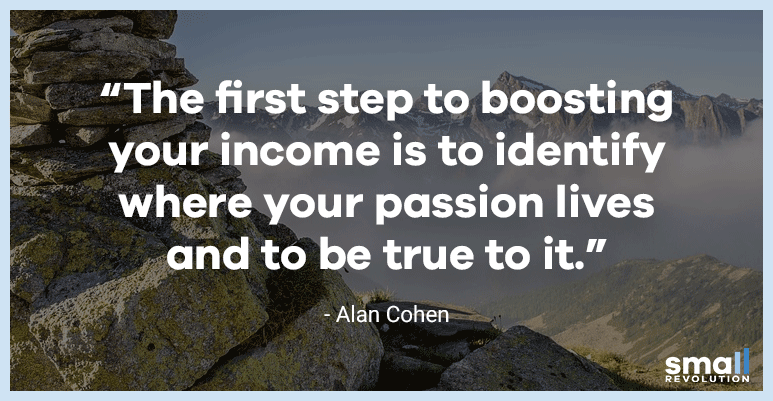Congratulations on choosing a new career path!
However, like all good things, getting an entry-level remote job requires effort. We understand exactly how that feels and we’ll give you the game plan to succeed.
First things first. Are you sure you want a remote job? Is it right for you?
A 2019 study on the state of remote work by Buffer found that a flexible schedule was the biggest advantage of remote work. On the flip side, many remote workers struggled to unplug since working from home makes it hard to separate work from the rest of your life.

The good news is that over 90% of remote workers would recommend remote work to people! The convenience of making your own schedule, avoiding a commute, and working in pajamas wins hands down.
Make your plan for today and every day, then work your plan.” – Margaret Thatcher
Analyze the Remote Jobs Scene
The breadth and scope of remote jobs have grown exponentially. Any job that can be done with a laptop and an internet connection have the potential to become remote work.
The broad categories include:
Freelance Jobs
These are independent contractors hired by companies to perform a specific task. They are usually location independent and can be sourced from all over the globe.
Freelance roles form the bulk of the remote work available, fueling the rise of the gig economy. This means that they have the lowest barrier of entry and therefore, a lot of competition.
The nature of freelance jobs ranges from those needing no prior experience, to the coveted premium contracts. Improve your remote job skills to become confident enough to apply for premium contracts.
Online Businesses
You can start an online business from anywhere. The business models are vast and include e-commerce stores, subscription businesses, online marketplaces, directories, and many others.
The barrier to entry is higher since you will need to create a specialized product or service, then market and ship it.
However, in the long term, it could be the most lucrative choice for financial freedom.
You don’t need any experience to start an online business but you need to learn or outsource a lot of skills to grow the business.
Full-Time Remote Work
There’s been a steady rise in internet companies that embrace having fully remote teams from all over the world. This is great news for talented professionals in countries with limited opportunities.
However, the barrier for entry is higher since you need an impressive resume and proven work experience.
Remote full-time jobs are highly competitive because they offer location flexibility with the security and benefits of regular employment. Apply for them once you have some experience under your belt.
Flexible Jobs
These are simply regular office jobs with the option for remote work. The ratio of remote work to office time is relative to the company. These jobs are increasingly popular since companies are experimenting with how to implement remote work programs.
If you have no experience, we recommend finding freelance roles or side hustle gigs to get you started.
Learn new skills to give you the energy to find your first entry-level job. Gaining momentum will boost your confidence and get you excited about the endless possibilities with remote jobs.
Increase your chances of hiring by identifying popular jobs in the world.
Choose the right remote job for you
As Socrates said, “Man Know Thyself.”
Choose a profession that plays to your talents and you will become exceptional in no time.
Unsure of exactly who you are? Don’t worry. Learn how to find your true passion in simple steps.
Do not make the mistake of applying for all jobs because you are desperate. Pick one direction to start from, and it will help you move further and faster.
Be deliberate and choose to focus on one thing at a time; you will never hit a nonexistent target.
What are you naturally gifted in?
Are you great with people? Try virtual customer service jobs.
Do you have great attention to detail and a great ear? Try transcribing.
Do you live on social media? Learn social media marketing to land remote jobs.
Have you always had a knack for writing? Turn to copywriting jobs.
Check out our extensive course on copywriting to get you on the right track.

Analyze the skills you need for an entry-level remote job
There are two main skills that are crucial for a remote worker:
Collaborative Communication
Since the internet and your laptop are the only connection to your co-workers or clients, you need to learn how to use them effectively.
There are hundreds of collaboration tools available but these are the most popular tools that you need to learn:
- Google Drive: a file management system
- Zoom: a conference call software
- Trello: a project management system
- Slack: a team communication app
This course on how to work with an online team effectively is invaluable and jam-packed with great nuggets of wisdom.
Business Writing Skills & Etiquette
Concise and clear writing is important in business. Especially in remote work where the majority of communication is in written form.
Understanding the basics of business etiquette is essential for leaving a good impression. Don’t lose a client because you used informal language.
Here are some quick tips to get you started. They’ll be a lifesaver:
- Check your tone in the email by reading it aloud and double-checking with a friend
- Avoid emoticons, since some people find them too informal
- Do not use text abbreviations like LOL, BTW, and others when communicating formally with clients.
- Use clear and concise language
Get Certified for Entry-Level Remote Job Skills
To stand out from your competition, earn certifications to prove proficiency in your chosen job category. Entry-level remote jobs are competitive so take all the advantages that you can find.
People in full-time employment can also take courses to help with the transition from full-time to remote work. Some great websites for this include Coursera, Udacity, Edx, LinkedinLearning, Udemy and many others.
Choosing the correct course can be overwhelming, so look for websites that specialize in helping remote workers level up.
Here are amazing courses on offer by Small Revolution. They are the same courses used to train our own distributed team globally.
Strategically Apply for Entry-Level Remote Jobs
Write a Remote Work Resume
Take your time to create an outstanding remote resume. The effort always comes across and the employer will be impressed by your attention to detail.
Cleverly crafting your resume will help you connect with potential clients. Find amazing tips on how to fill out all the resume sections here.
Are you a designer, copywriter or any other remote professional? Keep some sample assignments, designs, etc., ready to attach to applications as evidence of your skills.
Since you do not have any work experience, create fictional client problems or briefs and create solutions that display your newly acquired skills. Create about 2-3 different samples to show versatility and consistency in high-quality work.
Create a Client Pipeline/ Wishlist
Applying for jobs on job boards is not the only way to get entry-level remote jobs. Prospecting treats the job search like a business development process.
First, create your ideal client profile by considering your best skills, what type of company would benefit, and who in the company would be the best contact.
Second, get their attention by:
- Sending a thoughtful, personalized email message. Avoid sending the same message to all prospects; people can sniff out standard template emails.
- Researching their company and offering a tailored solution or idea that helps them in their work. This will show that you did your homework and you are genuinely interested.
Find Legitimate Remote Job Boards
The internet is the wild wild west when it comes to job scams.
Before identifying legitimate websites for finding remote jobs, learn the warning signs that indicate a job scam:
- You are asked about your personal information like credit card details or identification numbers too early in the process
- They boast of a get rich story or promise a very high pay for very little work. If you feel it’s too good to be true, it probably is
- They offer you the job immediately without validating your skills or require an upfront financial investment
- If there is no company information to be found online. Carry out due diligence on the hiring company.
- If they are using Gmail or any other personal email account, run away, fast!
To steer clear of scams, the best option is to look for jobs in reputable job boards that have been around for a while.
Here’s an exhaustive list of the major job boards:
To wrap up, here is how to land your first entry-level remote job:
- Make sure you want a remote job in the first place
- Identify the best remote career path for you
- Analyze your skills and learn the ones you need for a remote job
- Strategically apply for jobs using a good resume, legitimate job boards, and prospecting.
Check out Small Revolution and start your remote job journey today. We have the best courses to learn online job skills, insightful articles on life as a freelancer, and a job board where you can sign up for regular job updates.
Photo by Tirachardz / CC BY

